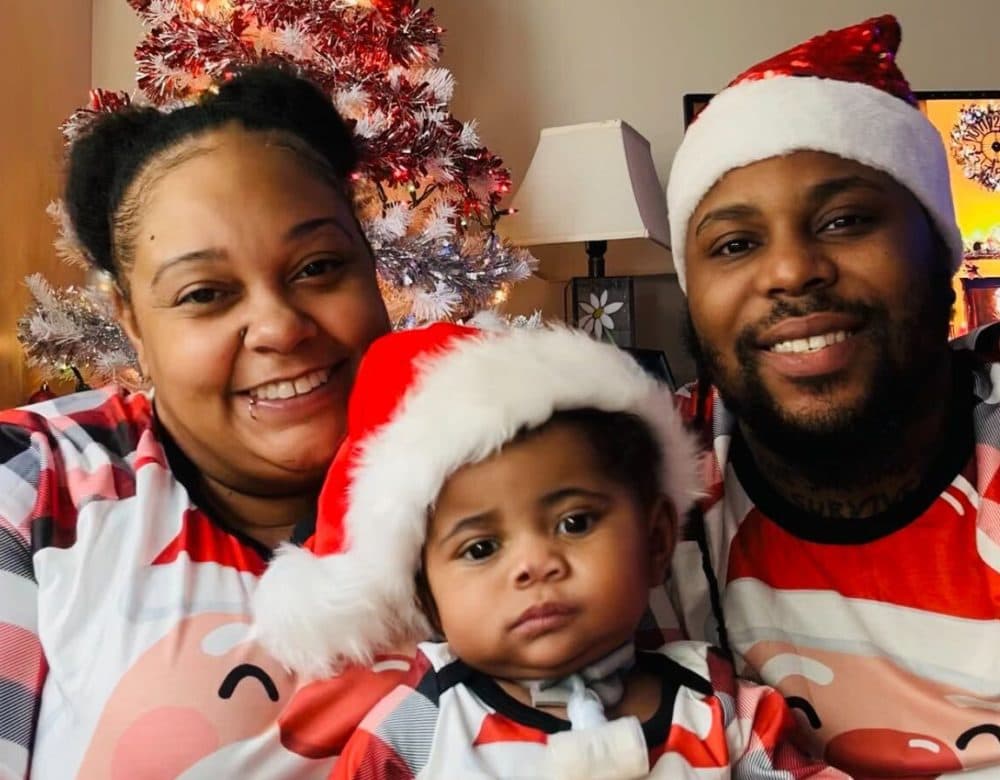Advertisement
One Massachusetts man's fight to stay with his family as he battles against deportation to Haiti

Get this story, and more like it, on our podcast.
Away from heated political rhetoric, U.S. immigration policy looms over the daily activities of people like Fredly Charles.
As a child, Fredly Charles arrived in the U.S. from Haiti on a valid visa. He became a temporary permanent resident and attended high school in Brighton, Massachusetts.
But he did not know his legal permanent residency had lapsed, which became a problem when he was arrested. Some charges were dropped and he was found not guilty on the only charge he faced. He has no criminal record.
And tangling with the criminal justice system brought him to the attention of federal immigration authorities, who began pursuing his deportation.
“Now I have to fight for my life, and I have to fight for my family's life,” Fredly Charles says.
His deportation could take away an essential caregiver for his daughter, Alianna, who has complex medical needs. Fredly and his wife, Tasha Charles, needed extensive training to even bring Alianna home from the hospital.
“For him to be taken away from us, it's going to leave me stuck,” Tasha Charles said. “Because what am I supposed to do [without him]?”
Soon, U.S immigration authorities could separate Fredly Charles from his wife and daughter. He would become one of the more than 20,000 Haitians deported since 2021.
The family and his lawyer hoped the government would use its discretion to terminate his deportation proceedings so he could legalize his status in the US. They have refused to do so, even though he has a pending application for Temporary Protected Status.
Advertisement
While the government decides what to do, the couple is taking care of Alianna. They're waiting to learn — and living with the fear — of what the future could hold for their family.
Interview Highlights
On taking care of their daughter Alianna
Fredly Charles: “I spend my days in the house with my daughter taking care of her while my wife is at work. You have to be trained to take care of [Alianna]. We had to go to certain classes to get her back home. If you're not used to the sickness that she has or the situation that she’s in, it’s going to be pretty tough.”
Tasha Charles: “Honestly, it's been a tough time because I wanted a baby for so long and then finally being blessed with my husband to have one. And she came out the way she did with her condition. It was kind of hurtful. And dealing with this, she was in the hospital for six months and it was like me and my husband going back and forth, hospital every day to be with our child. And then we had to train to be able to even get her home. So it's definitely been stressful.”
On what it would mean for their family if Fredly Charles was deported
Tasha Charles: “That will be a big loss for me in a sense, because he is the one when I'm not home. Nobody in our family knows how to care for my daughter. So for him to be taken away from us, it's going to leave me stuck. Because what am I supposed to do? He's the one that went through these trainings with me. He's her father. So I feel I would need him in the picture then to try and replace him with somebody else.”
“I don't think [Fredly] would last long [in Haiti], to be honest with the way that everything is going over there. And, the information that we even receive from there is crazy. Why would you want to send anybody back over there? Especially he has no conviction, no felonies, no nothing. He's married. We have a baby. What is the issue? And it's not fair that you guys released him. No papers, no nothing.
“The case is still going on. They're still denying everything. Even though we're giving them proof about our baby, her situation. And it's like no one over there has a heart to know that a mother, a wife, has a husband, a father to her child who's present in her life doing what he's supposed to do, that you're still willing to just take him away from her? Not even me, I don't care about me, but my daughter. The bond that him and her have is unbreakable right now. To see him away from her would break my heart.”
What happened in April of 2020 when Fredly Charles was about to get on the plane to be deported
Fredly Charles: “I was in a holding facility in Alexandria, Louisiana. I was waiting to be deported early in the morning in the camp and they called everybody else's name. Everybody had to go in, basically to get cuffed up and to go on the plane. My name was the first name the [U.S. Immigration and Customs Enforcement] officer called, and I answered. He told me I was not on the flight.
“It felt great because I was praying so hard. I really don't have no family out there. All my family and my wife, my mom, my dad and my brother, my sister, everybody's here. So me going out there and especially what's going on out there right now, I don't know how I would have been able to deal with it.”
On why he’s talking with a news organization about his case
Fredly Charles: “I don't have nothing to hide because I came here legally. I did all my paperwork. I got everything I'm supposed to have. And I never received nothing in the mail. And now I have to fight for my life. And I have to fight for my family's life. Because if I end up going over there, they're going to have to follow me. In the condition my daughter is in it's not going to be good for [her] out there. No electricity. She got a lot of stuff going on, that you need power for and there is no power.”
On what the family would say to the officials handling Charles's case
Tasha Charles: “What is happening here? From the beginning, we never understood why my husband never got his green card and his dad, his brother, his sister did. Now, his brother's an American citizen, and my husband has nothing. And we have our child with her condition. And you guys are still willing to deport him. It makes no sense to me. That you guys are just willingly able to rip families apart like that and it wouldn’t matter to you.”
We contacted several government bodies involved in deciding whether Fredly Charles will get deported. Here are their full responses.
Statement from ICE Enforcement and Removal Operations Boston Field Office Director Todd Lyons:
“Noncitizens placed into removal proceedings receive their legal due process from federal immigration judges in the immigration courts, which are administered by the Executive Office for Immigration Review (EOIR). EOIR is an agency within the U.S. Department of Justice (DOJ) and is separate from the Department of Homeland Security (DHS) and U.S. Immigration and Customs Enforcement (ICE). Immigration judges in these courts make decisions based on the merits of each individual case. ICE officers carry out the removal decisions made by the federal immigration judges.”
Statement from the Executive Office for Immigration Review:
“EOIR hears the cases of the individuals that DHS places into proceedings.
“Immigration judges and appellate immigration judges adjudicate all matters before them on a case-by-case basis, according to U.S. immigration law, regulations and precedent decisions. EOIR adjudicators consider all evidence and arguments presented by both parties, including country conditions, and decide each case in a manner that is timely, impartial, and consistent with applicable law and case precedent.”
Statement from United States Citizenship and Immigration Services about Fredly’s application for Temporary Protected Status:
“USCIS adjudicators evaluate every TPS application fairly, humanely and efficiently on a case-by-case basis, and the agency remains committed to upholding America’s promise as a nation of welcome and possibility with fairness, integrity, and respect for all we serve. USCIS has implemented new policy and operational improvements to reduce both the number of pending cases and overall processing times. Agency personnel are addressing outstanding processing issues and making changes to underlying procedures to achieve new efficiencies while ensuring the integrity and security of the immigration system. This includes improving processing times and decreasing pending cases. Individual processing times may vary depending on the complexities of each case, and TPS applicants may experience adjudication delays as USCIS navigates open application periods for several TPS extensions, designations and re-designations.”
Gabrielle Healy produced and edited this interview for broadcast with Peter O'Dowd. Healy also adapted it for the web.
This segment aired on January 19, 2023.

